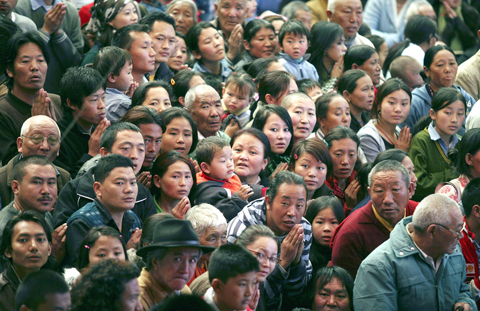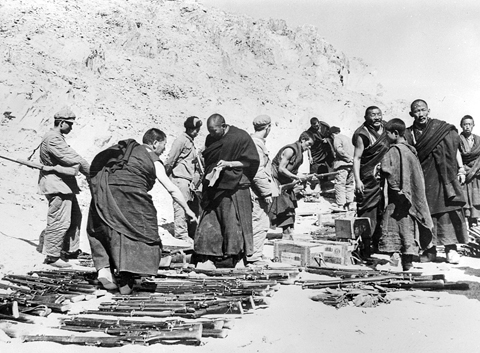Amid growing anger among Tibetan exiles at China’s subjugation of Tibet and its monasteries, bitter memories of a failed armed struggle haunt former guerrilla fighter Lhasang Tsering.
Over five decades, the Tibetan movement has drawn international attention and support for being among the world’s rare non-violent struggles, which has been credited to the Dalai Lama’s “middle way” approach, which stresses conciliatory negotiations with China.
Although the policy has made little headway with Beijing, the Dalai Lama was awarded the Nobel Peace Prize in 1989 for leading Tibet’s non-violent struggle.

PHOTO: AP
Against such a backdrop, 15 years of a violent conflict for Tibetan independence beginning in the late 1950s is looked at as a “deviation” that many Tibetans do not like to talk about.
With the passage of time and the fighters fading into congested refugee settlements, the episode has nearly been forgotten and is spoken about only in hushed tones.
But for Tsering, the armed struggle is as real as the day he joined it in northern Nepal’s Mustang district in 1972.

PHOTO: AFP
Among the prominent dissidents of the Tibetan diaspora, Tsering once worked with the Tibetan government-in-exile but resigned in 1990 to protest the Dalai Lama’s decision to give up the demand for an independent Tibet in favor of seeking autonomy within China.
A slight man with a goatee, Tsering, who also headed the Tibetan Youth Congress, has for decades criticized the middle way policy of the Dalai Lama.
“From my moral standpoint, the non-violence in surrendering to an evil is far worse than the use of violence to overcome the evil,” said Tsering, who now runs a bookshop in Mcleodganj, a suburb of Dharamsala, India.
If Tibetans do not defend themselves against a “colonial China,” they would one day disappear like the Inca civilization in South America, said the former fighter, who is now in his mid-50s.
The armed resistance against the Chinese began after the invasion of Tibet’s eastern Kham and Amdo regions by the People’s Liberation Army in the 1950s.
The Khampa fighters of the region announced the formation in 1958 of the Chushi Gangdruk — which means “four rivers, six ranges” and refers to Kham — to stop the Chinese army’s advance into Lhasa.
When the March 10, 1959, uprising against the Chinese failed, the Gangdruk guerrillas helped the Dalai Lama flee to India, Tsering said, adding that the fighters then retreated to Mustang, from where they conducted raids into Tibet and waged war with the Chinese army for 15 years.
At its peak, the force consisted of an estimated 2,000 Tibetans and received support like arms, ammunition and training from the CIA.
“We were certainly few to win against the Chinese but enough to create a lot of problems for them,” he said.
But with the US government’s rapprochement with China, aid and supplies from the CIA began to wane in the late 1960s. Nepalese troops also began a crackdown to crush the fighters.
Chushi Gangdruk’s operations finally ceased in 1974 after the Dalai Lama taped a message telling the fighters to lay down their weapons and surrender.
“The fighters could not say no to the Dalai Lama, but several committed suicide as they had vowed to fight to the bitter end,” Tsering said, choked with emotion and with tears in his eyes. “They could find freedom and dignity only in death.”
Others were arrested, killed or escaped.
Tsering still justified an armed struggle for his homeland and said he would be ready to put his “life on the line” were there an opportunity.
“It takes two to shake hands, but the Chinese found no need to shake hands with a bunch of helpless refugees,” he said, adding as an afterthought: “It takes only one to deliver a punch.”
Tsering said the exiled Tibetans have been confused and frustrated with talks with China because their movement lacks clarity of purpose. Frustration has also grown after the lack of progress after 50 years of exile following the flight of the Dalai Lama from Tibet on March 17, 1959.
Mentioning that Tibetans in Tibet were sacrificing their lives for independence, Tsering pointed toward the residence of the Dalai Lama and said: “If only the holy one would restore clarity of purpose and return to the cause of freedom.”
“He is our spiritual leader, and Tibetans are not in a position where they can question His Holiness, but to force Tibetans to choose between freedom and faith is not right,” Tsering said.

Seven people sustained mostly minor injuries in an airplane fire in South Korea, authorities said yesterday, with local media suggesting the blaze might have been caused by a portable battery stored in the overhead bin. The Air Busan plane, an Airbus A321, was set to fly to Hong Kong from Gimhae International Airport in southeastern Busan, but caught fire in the rear section on Tuesday night, the South Korean Ministry of Land, Infrastructure and Transport said. A total of 169 passengers and seven flight attendants and staff were evacuated down inflatable slides, it said. Authorities initially reported three injuries, but revised the number

A colossal explosion in the sky, unleashing energy hundreds of times greater than the Hiroshima bomb. A blinding flash nearly as bright as the sun. Shockwaves powerful enough to flatten everything for miles. It might sound apocalyptic, but a newly detected asteroid nearly the size of a football field now has a greater than 1 percent chance of colliding with Earth in about eight years. Such an impact has the potential for city-level devastation, depending on where it strikes. Scientists are not panicking yet, but they are watching closely. “At this point, it’s: ‘Let’s pay a lot of attention, let’s

UNDAUNTED: Panama would not renew an agreement to participate in Beijing’s Belt and Road project, its president said, proposing technical-level talks with the US US Secretary of State Marco Rubio on Sunday threatened action against Panama without immediate changes to reduce Chinese influence on the canal, but the country’s leader insisted he was not afraid of a US invasion and offered talks. On his first trip overseas as the top US diplomat, Rubio took a guided tour of the canal, accompanied by its Panamanian administrator as a South Korean-affiliated oil tanker and Marshall Islands-flagged cargo ship passed through the vital link between the Atlantic and Pacific oceans. However, Rubio was said to have had a firmer message in private, telling Panama that US President Donald Trump

CHEER ON: Students were greeted by citizens who honked their car horns or offered them food and drinks, while taxi drivers said they would give marchers a lift home Hundreds of students protesting graft they blame for 15 deaths in a building collapse on Friday marched through Serbia to the northern city of Novi Sad, where they plan to block three Danube River bridges this weekend. They received a hero’s welcome from fellow students and thousands of local residents in Novi Said after arriving on foot in their two-day, 80km journey from Belgrade. A small red carpet was placed on one of the bridges across the Danube that the students crossed as they entered the city. The bridge blockade planned for yesterday is to mark three months since a huge concrete construction